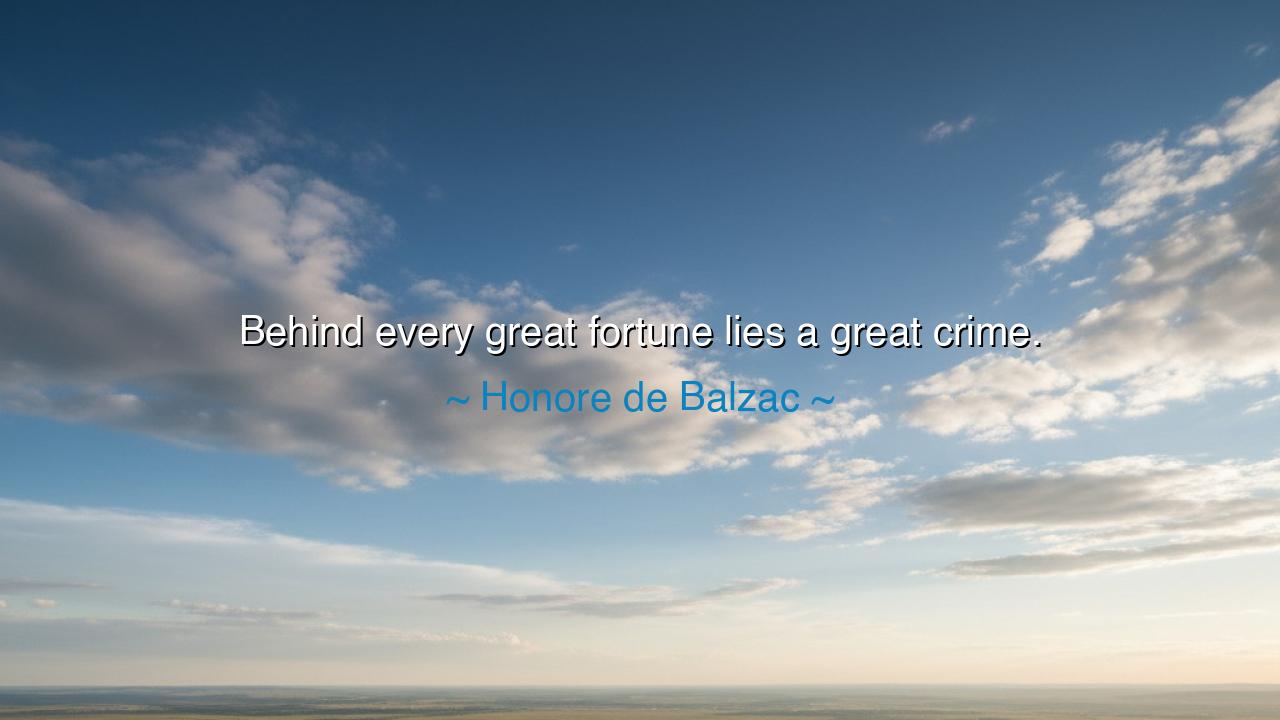
Behind every great fortune lies a great crime.






The words of Honoré de Balzac—“Behind every great fortune lies a great crime”—echo through time like a judgment spoken by history itself. They are not the bitter words of envy, but the clear-sighted revelation of a man who saw the world without illusion. Balzac, the keen observer of human ambition and corruption, wrote these words in Le Père Goriot, one of his many masterworks depicting the dark marriage between wealth and moral decay. In this brief but thunderous sentence, he unveils an eternal truth: that in the glitter of riches often hides the shadow of wrongdoing, and that behind the grandeur of many empires lies the suffering of the unseen.
At its heart, this quote is not merely a condemnation of wealth, but a warning about the nature of power. To amass great fortune, one must often cross lines that conscience would rather avoid—exploiting labor, manipulating systems, or silencing opposition. Balzac, who lived in post-revolutionary France, had witnessed firsthand how fortunes rose from ashes: noble estates seized, merchants corrupted, bankers and politicians thriving on deceit. He understood that great wealth was rarely the fruit of pure virtue—it was, more often, the harvest of injustice. His words are a mirror held up to society, reflecting that prosperity, when built upon the suffering of others, carries within it the seed of guilt.
History bears witness to the weight of Balzac’s insight. Consider the industrial titans of the nineteenth century, whose wealth reshaped nations but whose empires were built upon the backs of laborers. John D. Rockefeller, Andrew Carnegie, and others created industries that advanced civilization, yet their methods—monopolies, exploitation, suppression of unions—cast long shadows over their legacies. Their fortunes changed the world, yes, but they did so at a moral cost. And even today, in the modern age, the story repeats itself: sweatshops producing luxury goods, corporations profiting from destruction, nations enriched by war. Time may change the tools, but the truth remains the same—great fortune is often born of great compromise.
Yet, Balzac’s quote is not meant to destroy faith in human endeavor, but to awaken moral vigilance. It calls upon each generation to look deeper, to ask: At what price is success achieved? It reminds us that unchecked ambition corrupts not only the soul of the individual but the fabric of society itself. The one who pursues wealth without conscience becomes a prisoner of his own greed. The ancient philosophers warned of this long before Balzac. Aristotle spoke of “the boundless desire for more,” and Seneca declared that “riches are a burden to the wicked.” Both knew that fortune without virtue is a curse disguised as glory.
However, there is also a way to redeem fortune—to build wealth not upon crime, but upon creativity, labor, and service. The same power that can corrupt can also uplift when guided by integrity. The modern world has seen such examples—Muhammad Yunus, who founded microfinance to lift the poor; Andrew Carnegie, who, after a lifetime of ruthless enterprise, spent his later years giving away his fortune to build libraries, universities, and foundations for learning. These figures teach that money itself is not evil—it is the use of power without compassion that darkens its origin.
Balzac’s insight thus becomes a moral compass. It warns not only those who pursue wealth but also those who admire it blindly. The true measure of a person is not in the gold they possess, but in the purity of the path that led them there. The great crime behind many fortunes is not always a single act of betrayal—it may be the quiet acceptance of inequality, the indifference to another’s pain, the willful blindness to injustice. To live rightly, one must refuse to participate in such hidden crimes, no matter how sweet the reward.
Let this, then, be the lesson for all who hear: seek greatness through virtue, not through the ruin of others. Wealth gained through deceit decays; wealth built upon truth endures. Remember that every empire built on blood will one day fall to dust, but the name of the just will be remembered forever. Be ambitious, yes—but let your ambition serve humanity, not exploit it. For in the end, when the gold is gone and the monuments crumble, it is not fortune that defines a man, but the deeds that earned it.
So, my child, walk the path of honor. Build your dreams upon fairness and compassion. Let your hands create, not corrupt. Let your heart guide your labor. And when success finds you, may it come not as a shadow of crime, but as the bright light of merit—proof that greatness built in goodness is the only fortune worth possessing.






AAdministratorAdministrator
Welcome, honored guests. Please leave a comment, we will respond soon